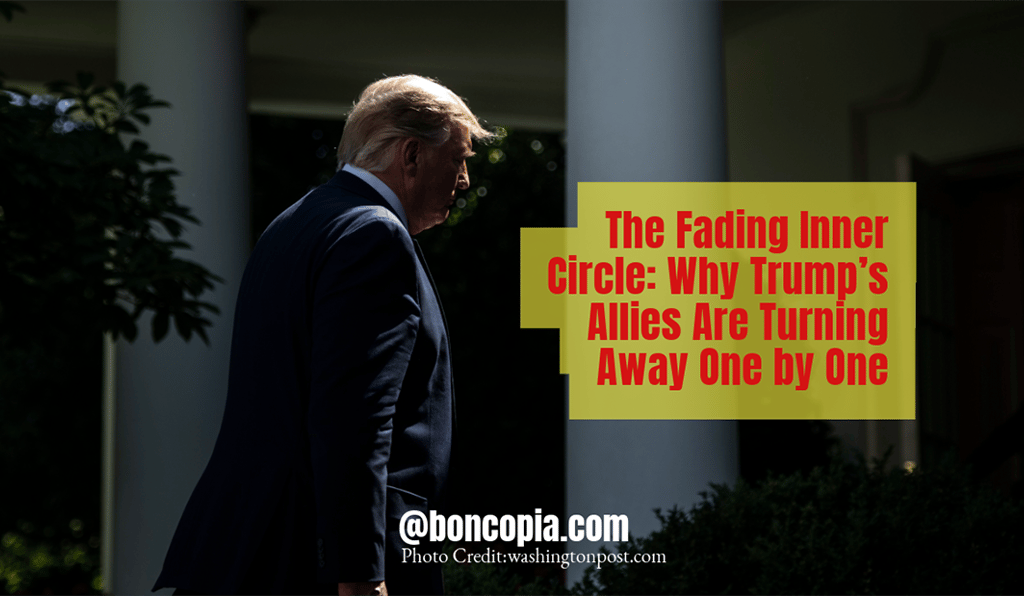The Fading Inner Circle: Why Trump’s Allies Are Turning Away One by One
5/9/20254 min read


The Fading Inner Circle: Why Trump’s Allies Are Turning Away One by One
Introduction: A Shifting Tide
Donald Trump’s political journey has been marked by fierce loyalty from his allies and supporters, but cracks in that loyalty are becoming increasingly visible. From his first term to his second presidency in 2025, several high-profile allies have distanced themselves, citing personal, ideological, or strategic differences. This blog post dives into the reasons behind these defections, highlights key examples, and explores who might be next to step away. As Trump’s policies and leadership style continue to polarize, the question looms: how sustainable is his inner circle?
Why Are Allies Turning Away?
Trump’s leadership is characterized by bold, often controversial decisions—tariffs, immigration crackdowns, and challenges to international alliances. While these moves energize his base, they’ve alienated some allies who once stood firmly by him. Here are the primary reasons for the defections:
Policy Disagreements: Trump’s aggressive trade wars, particularly the sweeping tariffs imposed in 2025, have sparked concern among allies who fear economic fallout. His foreign policy shifts, like pressuring NATO and proposing concessions to Russia in Ukraine, have also raised alarms.
Personal Loyalty Demands: Trump’s expectation of unwavering loyalty often puts allies in difficult positions, especially when they face public or legal scrutiny for supporting him.
Authoritarian Concerns: Some former supporters have cited Trump’s expansion of executive power and media attacks as steps toward authoritarianism, prompting them to step back.
Political Survival: As public opinion shifts, especially with declining approval on economic issues, some allies are distancing themselves to protect their own political futures.
Key Examples of Allies Who Turned Away
Lindsey Graham (2021)
Once one of Trump’s staunchest defenders, Senator Lindsey Graham publicly broke with Trump after the January 6, 2021, Capitol insurrection. Graham declared, “Trump and I, we’ve had a hell of a journey. I hate it to end this way… Enough is enough.” His decision was driven by the violence incited by Trump’s rhetoric and a desire to preserve his own political standing.Kevin McCarthy (2021)
Then-House Minority Leader Kevin McCarthy reportedly discussed pushing Trump to resign post-January 6, signaling a fracture in their alliance. McCarthy’s brief pivot away was motivated by the need to distance the GOP from the insurrection’s fallout, though he later reconciled with Trump.John Bolton (2020-2025)
Trump’s former National Security Adviser, John Bolton, became a vocal critic after leaving the administration in 2019. In 2025, Bolton criticized Trump’s tariff policies, arguing they harm allies and benefit rivals like China. Bolton’s defection stems from ideological differences and personal disillusionment with Trump’s foreign policy.GOP Base Segments (2025)
Recent posts on X and reports indicate growing unease among some GOP voters, particularly evangelicals and moderates, who feel “repelled” by Trump’s polarizing style and economic policies. This sentiment, highlighted in an AlterNet article shared widely on X, suggests even his core base is fraying.
Recent Context: The Tariff Backlash
In 2025, Trump’s tariff policies have been a lightning rod for criticism. His initial 20% tariffs on the EU and 145% tariffs on China caused market volatility and drew ire from allies like Canada and Germany. The subsequent 90-day pause on some tariffs was cheered by supporters but raised suspicions of insider trading, further eroding trust. Allies like Treasury Secretary Scott Bessent have defended Trump’s “art of the deal” strategy, but others, including international leaders, are reevaluating their reliance on the U.S.
Who Might Be Next?
Predicting the next defection is speculative but grounded in current tensions. Here are potential candidates:
Mike Waltz (National Security Adviser): Waltz has faced criticism for the administration’s unclear Ukraine policy. If Trump’s envoy Steve Witkoff’s pro-Russia stance continues to alienate Republicans, Waltz may distance himself to maintain credibility.
Marco Rubio (Secretary of State): Rubio, a traditional conservative, may clash with Trump’s unconventional foreign policy, especially if pressure mounts from European allies over Ukraine or NATO.
Moderate GOP Senators: Figures like Susan Collins or Lisa Murkowski, who’ve previously broken with Trump, could publicly oppose him if his policies, like mass deportations or media crackdowns, escalate.
The next defection will likely hinge on a major policy misstep or public backlash, particularly if economic conditions worsen or Trump’s approval ratings slide further.
What’s at Stake?
Each defection weakens Trump’s political capital, making it harder to push his agenda through Congress or maintain international influence. As allies turn away, rivals like China stand to gain, with countries like Canada already exploring closer trade ties with Beijing. For supporters, these departures raise questions about loyalty and the feasibility of Trump’s vision. For critics, they signal a broader unraveling of his grip on the GOP.
Conclusion: A House Divided?
Trump’s ability to command loyalty has been a cornerstone of his political success, but the slow erosion of his inner circle tells a different story. From Graham and McCarthy to segments of his base, allies are stepping back for reasons ranging from policy disputes to self-preservation. As 2025 unfolds, the world watches to see who else might walk away—and whether Trump can adapt to a shrinking circle of trust.
Thought-Provoking Questions for Readers
Are Trump’s allies abandoning him out of principle, or are they simply protecting their own interests?
Can Trump maintain his political influence if more GOP figures distance themselves?
Who do you think will be the next to turn away from Trump, and why?
How might the loss of allies impact Trump’s ability to navigate global challenges like trade wars or conflicts?
Word Count: 950
Note on Sources: This post draws from recent news and posts on X to reflect current sentiment and events as of May 8, 2025. For pricing or subscription details related to SuperGrok or x.com premium, visit https://x.ai/grok or https://help.x.com/en/using-x/x-premium. web:multiplepost:multiple
Disclaimer: X posts reflect public sentiment but are not conclusive evidence. Readers are encouraged to verify information independently.
hello@boncopia.com
+13286036419
© 2025. All rights reserved.